Nearly a thousand people gathered Monday on Parliament Hill in front of the Centennial Flame to protest the Keystone XL pipeline, which would transport tar sands crude oil to Texas. Organized by the Council of Canadians, Greenpeace Canada, and the Indigenous Environmental Network (IEN), the solidarity rally drew participants ready to risk arrest, by attempting a sit-in in the Centre Block or by supporting those engaging in civil disobedience.
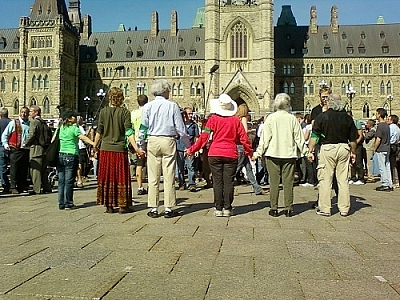
Before the main event, several high-profile speakers addressed the crowd. Clayton Thomas-Muller, indigenous tar sands organizer for the IEN, kicked off the event by thanking the Algonquin First Nation for use of the “unceded land” on which lies the parliamentary buildings. First Nation Elder Terry McKay then led the gathering in prayer to Creator, followed by a drum song.
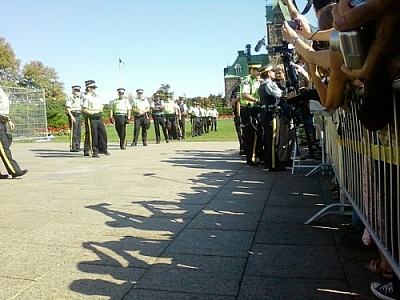
“Justice!” resounded all around as, to fire up the crowd, Thomas-Muller called, “What are we here for?”
Chief Bill Erasmus of the Dene First Nation and the Assembly of First Nations took the podium, pointing out that people who live downstream from tar sands tailings ponds are dying of cancer.
“Shame!” cried the protesters.
Chief Erasmus noted that it takes four to five barrels of water to produce one barrel of oil.
“Shame!”
Chief Erasmus claimed that Canada’s goal is to become the number one producer of oil.
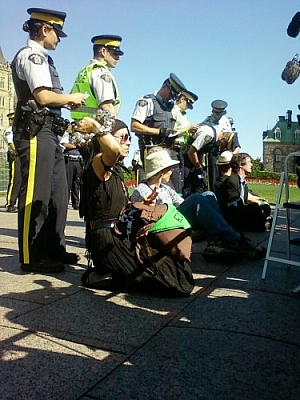
“Shame!”
He said private landowners are concerned about cleaning up spills and that the original Keystone pipeline, operated by the same company that would operate the new proposed pipeline, has had twelve spills in the last fourteen months.
“Shame!”
Chief Erasmus concluded with an appeal to President Obama, who will decide next month whether to approve or reject the Keystone XL pipeline: “Obama, come up with a new sustainable way to deal with fossil fuels. We need your help.”
David Coles, President of the Communications, Energy and Paperworkers Union of Canada (CEP), said about the pipeline, “It’s a no-brainer and Harper’s got no brains.”
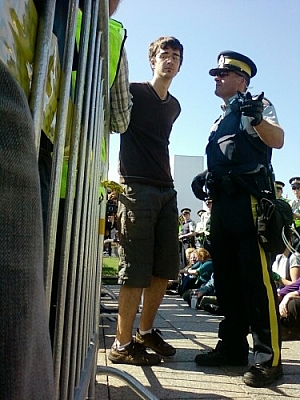
Dispelling greenwashing claims, Coles asked, “What blooming idiot came up with the idea of ‘ethical oil’?”
Chief Jackie Thomas of the Sai-kuz First Nation attended the event as a symbol of solidarity. Her tribe is battling not the Keystone XL pipeline, but the Enbridge Northern Gateway pipeline, which would transport tar sands oil from Alberta to BC’s coast. Her message to Enbridge: “Don’t try us.”
Lionel Lepine, lawyer for the Athabasca Chipewyan Dene Nation, said, “They call it the House of Commons. I don’t see any common sense in there.” Lepine said his community is suffering tremendously from tar sands development, its people dying of cancer and other illnesses. The documentary H2Oil demonstrates its plight.
“I vow until my dying breath to continue this fight,” finished Lepine.
Representing Greenpeace Canada and the Lubicon Cree First Nation, Melina Laboucan-Massimo said her family is also ill, but from the Albertan oil spill that was left unreported for five days last spring, until the federal election had passed.
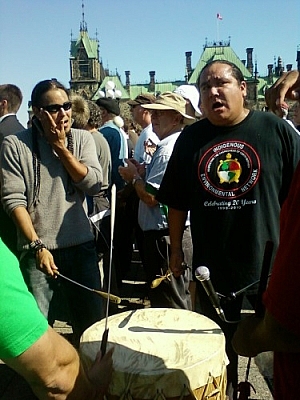
Her voice quivered at times as she enumerated her relatives’ symptoms, lamenting that a few individuals are profiting from their pain. Echoing Lepine, Laboucan-Massimo asserted, “This behind me is the House of Commons, not the House of Corporations.”
Former Senate page Brigitte DePape was there representing the Youth Climate Justice Coalition, which DePape revealed is organizing a tribunal to put the Harper government on trial. “This is where change is happening,” DePape told the protesters, saying she was happy to be standing with them and “not in there”, pointing behind her to Parliament. DePape’s parting message was to “organize together for another possible Canada”.
Council of Canadians chairperson Maude Barlow referred to an imaginary map depicting current and proposed pipelines, and said, “It looks like a corporate snakes and ladders board game.”
“In my opinion,” said Barlow, “the people crossing the line today are not breaking the law. The people breaking the law are the Harper government.”
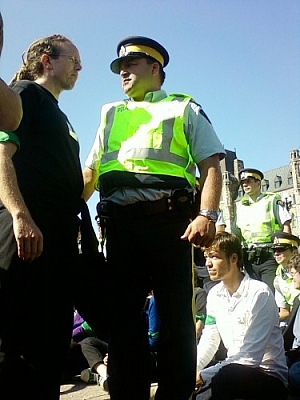
Barlow cited the Fisheries Act, the Kyoto Protocol, the UN Declaration on the Human Right to Water, and the UN Declaration on the Rights of Indigenous Peoples.
“Today we stand on the face of change,” Thomas-Muller had told the crowd.
Sit-in participants lined up behind police fences and, in waves of six people, they crossed the fence to be arrested. The first to cross were Maude Barlow, George Poitras, former Chief of the Mikisew Cree First Nation, Dave Coles, Tony Clarke, Director of the Polaris Institute, and Elizabeth Bernstein of the Nobel Womens’ Initiative, among others.
Also in attendance at the rally were Green Party of Canada leader Elizabeth May and Dennis Bevington, NDP MP, Western Arctic. Charlie Angus, NDP MP, Timmins-James Bay, appeared to show his support around three o’clock, while Stéphane Dion, Liberal MP, St-Laurent–Cartierville, arrived at 9 a.m.
More than 200 people were arrested for trespassing, fined between $55 and $75, and banned from Parliament Hill for one year.
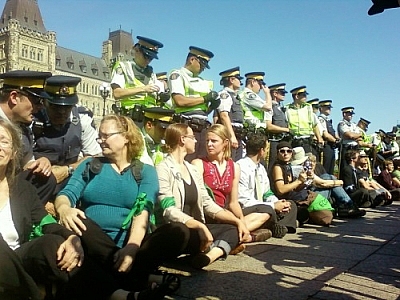
Opponents of the Keystone XL pipeline say the project violates First Nations Treaty Rights.
It threatens food and water supplies because it crosses the Ogallala Aquifer, the world’s largest known underground lake, as well as countless farms. The project takes jobs out of Canada and contributes to added tar sands pollution, increasing the amount of carbon in the atmosphere.
As Dave Coles asked the crowd amassed in front of the Centre Block, “What about energy security for Canada?”
Thomas-Muller gave participants hope that positive change is forthcoming. “This is who we are,” he said, “but this is not who we will continue to be.”
This article was originally published by Straight Goods News.




Search Niackery
×